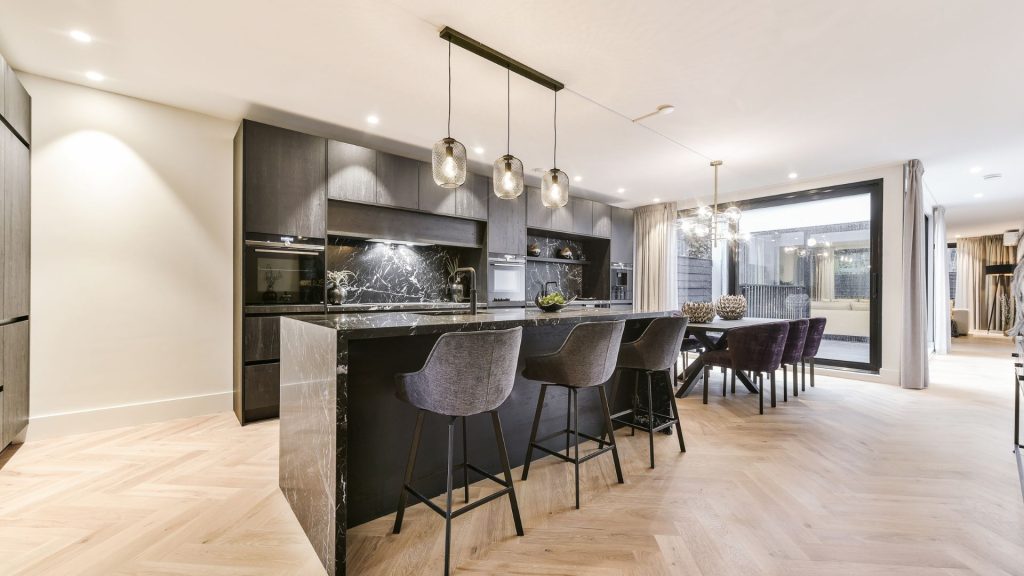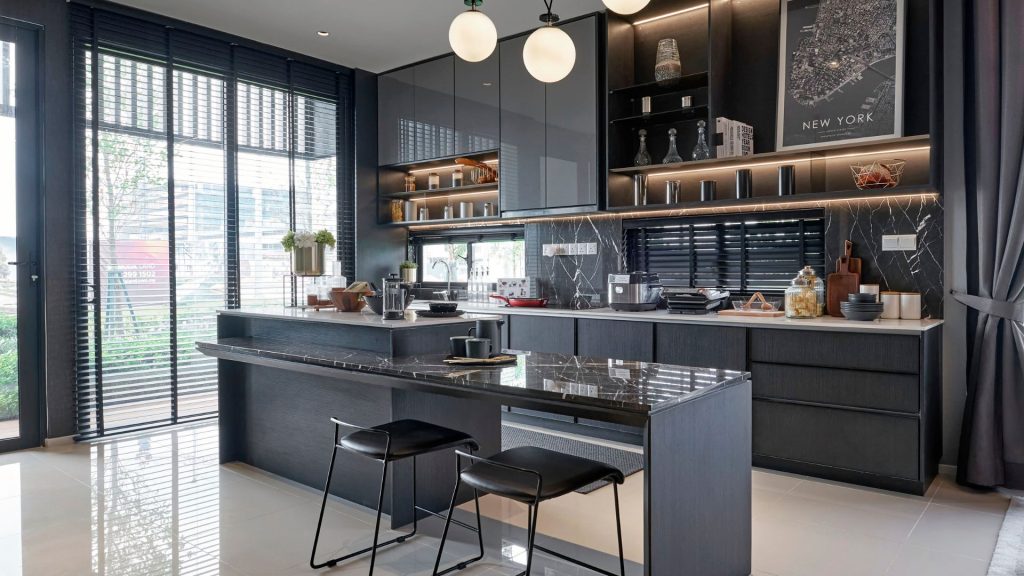Kitchens have evolved significantly from their traditional roles as spaces for meal preparation to becoming the heart of the home, often outfitted with the latest technology to enhance both functionality and style. In today’s homes, kitchens are high-tech centers that integrate advanced appliances and technologies, facilitating easier cooking methods, better food preservation, and enhanced kitchen management. This blog post will explore the integral role that technology plays in modern kitchen designs, highlighting how it contributes to the efficiency and aesthetic appeal of this essential space.
The advancement of technology has not only made kitchen appliances smarter but also transformed the way homeowners interact with their cooking spaces. From refrigerators that can help manage grocery lists to ovens that can be controlled remotely, technology is making kitchens more connected and intuitive. This post will delve into the various technologies that are reshaping modern kitchens, examining everything from smart appliances and connectivity options to innovative cooking methods and sustainability efforts.
Smart Appliances

Smart appliances are at the forefront of kitchen technology, offering features that boost convenience and efficiency. Refrigerators with touchscreen interfaces can now track expiration dates, suggest recipes based on contents, and even order groceries online. Smart ovens adjust cooking times and temperatures based on the dish, ensuring perfect culinary results every time. Additionally, dishwashers with sensors can optimize water and energy use based on load size, enhancing environmental friendliness and cost-effectiveness.
These smart devices are not just functional; they are also designed to integrate seamlessly into the aesthetic of any modern kitchen. Manufacturers now focus on creating appliances that are not only technologically advanced but also stylish, with customizable designs and finishes to match any home décor. The integration of these appliances into modern kitchens helps to create a space that is both technologically efficient and visually appealing.
Connectivity and Integration
The modern kitchen is increasingly becoming a hub of connectivity, where all devices are interconnected to create a cohesive and highly efficient environment. Through Wi-Fi and Bluetooth, kitchen appliances can communicate with each other, sync with mobile devices, and even connect to virtual assistants like Amazon Alexa or Google Assistant for voice-controlled operation. This connectivity allows for a level of convenience and control that was unimaginable in past decades.
For example, imagine being able to preheat your oven while you’re still on your way home from work, or getting notifications on your smartphone when your dishwasher cycle is complete. This kind of integration not only saves time but also enhances the overall cooking and living experience. As kitchens become more connected, the ability to manage and monitor kitchen activities remotely is becoming a key factor in modern kitchen designs.
Innovative Cooking Technologies
Innovative cooking technologies are revolutionizing the way we prepare food. Induction cooktops, for instance, use electromagnetic fields to heat up pots and pans directly while keeping the cooktop surface cool to the touch, enhancing safety and energy efficiency. Sous vide machines offer a method of cooking that uses precise temperature control to achieve consistent and optimal results that are difficult to achieve through traditional cooking methods.
These technologies not only make cooking more precise and efficient but also open up new culinary possibilities, allowing home chefs to experiment with techniques used in professional kitchens. Moreover, many of these devices are designed to be compact and easy to store, which is particularly beneficial in urban homes where space is at a premium. The adoption of these advanced cooking technologies in home kitchens is a testament to how deeply technology is embedding itself in the culinary world.
Energy Efficiency and Sustainability
As environmental concerns continue to grow, the importance of energy efficiency and sustainability in kitchen appliances has become more pronounced. Today’s high-tech appliances often come with energy-saving features that help reduce the kitchen’s overall environmental impact. For example, modern refrigerators, dishwashers, and cooking appliances are designed to use minimal electricity and water, aligning with broader sustainability goals.
Furthermore, many manufacturers are now producing appliances that are not only energy efficient but also made from recycled materials, contributing to a circular economy. These efforts are not just good for the planet; they also resonate with consumers who are increasingly making purchasing decisions based on environmental impact. By choosing energy-efficient and sustainable kitchen technologies, homeowners can play a part in environmental conservation while enjoying the latest in kitchen convenience and design.
The Future of Kitchen Technology
The future of kitchen technology holds promising innovations that could further transform this central part of the home. Artificial intelligence (AI) is expected to play a significant role, with appliances that can learn from user behaviors and adapt to meet their needs. For instance, imagine a refrigerator that can analyze your usage patterns and automatically adjust its energy use to save power during off-peak hours or suggest a weekly meal plan based on what it knows you like to eat.
The potential for integration with home automation systems is also expanding, paving the way for kitchens that are not only smart but also interconnected with the entire home ecosystem. This could mean kitchens that automatically adjust lighting based on the time of day, faucets that measure water usage and suggest conservation strategies, or even trash cans that monitor waste levels and sort recyclables. The integration of these technologies will not only make kitchen tasks easier but also turn the kitchen into a true command center of the modern home.
Design Considerations with Technology
When incorporating technology into kitchen designs, it’s crucial to balance high-tech features with the overall aesthetic and functional flow of the space. Homeowners must consider how these technologies will fit into their daily lives and choose solutions that enhance rather than complicate kitchen routines. It’s important to select appliances and features that are intuitive and user-friendly, ensuring that all family members can benefit from the new technology.
Additionally, the physical placement of these technologies should be strategically planned to maintain the kitchen’s design integrity and operational efficiency. For instance, smart displays or charging stations should be integrated into areas where they are easily accessible yet unobtrusive. Choosing the right technology should complement the kitchen’s design theme, whether it’s minimalist, contemporary, or traditional, allowing technology and style to blend seamlessly.
Challenges and Considerations
Integrating high-tech solutions into kitchen designs is not without its challenges. The cost of advanced technology can be prohibitive for some homeowners, making it important to prioritize which technologies will provide the most benefit. Additionally, the rapid pace of technological advancement can lead to concerns about obsolescence, with today’s cutting-edge appliances potentially becoming outdated within a few years.
Maintenance is another consideration, as more sophisticated appliances can require specialized care and repairs. Homeowners should be prepared for the possibility of needing professional help to troubleshoot and maintain high-tech kitchen equipment. It’s important to weigh these factors carefully when deciding to integrate advanced technology into kitchen designs, ensuring that the benefits outweigh the potential drawbacks.
Case Studies
Real-life examples can vividly illustrate the benefits of incorporating technology into kitchen designs. One case study might highlight a family who installed a smart refrigerator and oven in their kitchen, which allowed them to streamline meal preparation and food storage, significantly cutting down on waste and inefficiency. Another example could showcase a kitchen equipped with a complete home automation system, where lighting, climate, and appliances are all controlled via a central system, offering unparalleled convenience and energy efficiency.
These case studies can provide practical insights and inspiration for homeowners considering similar upgrades. By showcasing actual outcomes and user experiences, potential renovators can better understand how these technologies might function in their own homes, providing a clearer picture of what to expect from their investment.
As we have explored, the integration of technology in modern kitchen designs offers more than just convenience; it brings a transformation in how we interact with our kitchen spaces, making them more efficient, sustainable, and enjoyable to use. Whether through smart appliances, innovative cooking technologies, or energy-saving features, the modern kitchen is becoming a showcase of what’s possible when technology meets design.
If you’re considering upgrading your kitchen and need expert advice on how to incorporate technology into your renovation, Selective Remodeling is here to help. Our experienced team can guide you through the latest technological advancements and help integrate them seamlessly into your kitchen design. Contact us today to discover how we can enhance your kitchen renovation project with the perfect blend of technology and style.


